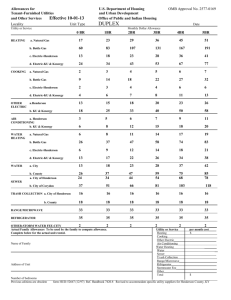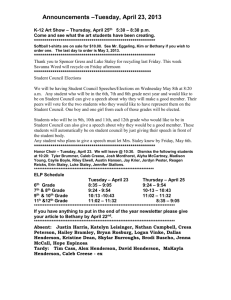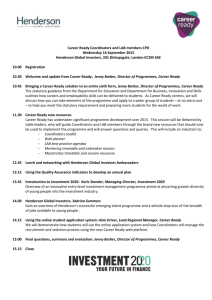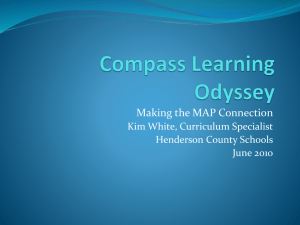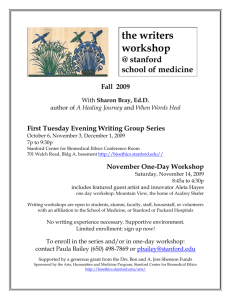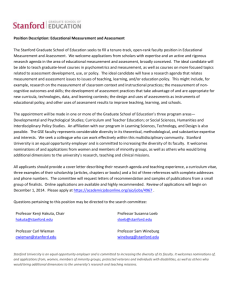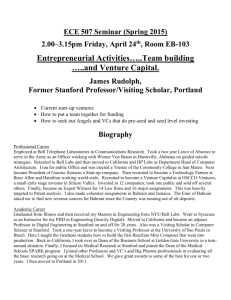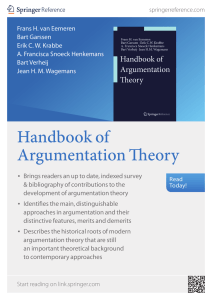Henderson CV 1-30-2015 - iSearch
advertisement
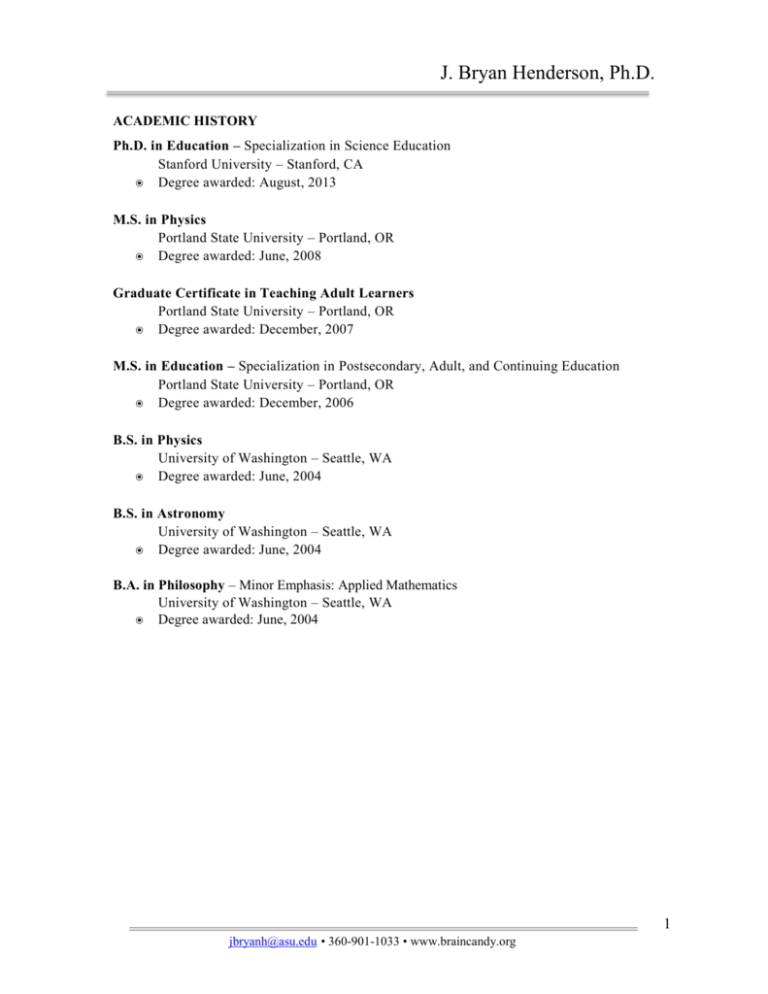
J. Bryan Henderson, Ph.D. ACADEMIC HISTORY Ph.D. in Education – Specialization in Science Education Stanford University – Stanford, CA ๏ Degree awarded: August, 2013 M.S. in Physics Portland State University – Portland, OR ๏ Degree awarded: June, 2008 Graduate Certificate in Teaching Adult Learners Portland State University – Portland, OR ๏ Degree awarded: December, 2007 M.S. in Education – Specialization in Postsecondary, Adult, and Continuing Education Portland State University – Portland, OR ๏ Degree awarded: December, 2006 B.S. in Physics University of Washington – Seattle, WA ๏ Degree awarded: June, 2004 B.S. in Astronomy University of Washington – Seattle, WA ๏ Degree awarded: June, 2004 B.A. in Philosophy – Minor Emphasis: Applied Mathematics University of Washington – Seattle, WA ๏ Degree awarded: June, 2004 1 jbryanh@asu.edu • 360-901-1033 • www.braincandy.org J. Bryan Henderson, Ph.D. TEACHING HISTORY Assistant Professor – Arizona State University (2014 - Present) Teach EDP 554 (Analysis of Variance Methods), which is a graduate level course in the design of quantitative research and the family of statistical techniques known as Analysis of Variance (ANOVA). Also teach EDP 540, which is a graduate level course focusing on various theoretical views of the nature of learning. Lecturer – Stanford University (2013 - 2014) Taught statistics to Stanford Master’s students through an applied approach where, in lieu of traditional problem sets, students write papers analyzing published research articles through the new statistical lenses they are developing in class. Lectures incorporate interactive technology that promotes peer-to-peer discussion. After seven terms of experience as a graduate research assistant, offered this position due to popular and successful implementation of technology and peer learning into traditionally lecture-heavy statistics curriculum. Graduate Teaching Assistant – Stanford University (2009 – 2012) Seven terms of experience teaching statistics to Stanford Master’s students through weekly recitation sessions and guest lectures for Dr. Ann Porteus. Initiated and facilitated Dr. Porteus’ adoption of Classroom Response System (CRS) formative assessment technology in her lectures, as inspired by student feedback on the use of technology and peer learning techniques in my recitation sessions. Physics Instructor – Portland Community College Faculty Diversity Internship Program (2007 – 2008) Under the guidance of Dr. Bob Drosd, responsible for lecture instruction of a yearlong sequence in algebra-based physics. Program included frequent training workshops, as the mission of PCC was to transition from a teaching-centered to a learning-centered ethos. Marked my first use of CRS technology and peer learning pedagogy in my teaching, and positive student feedback inspired me to begin PhD study at Stanford University with a focus on the learning science surrounding formative assessment technology and social learning. Senior Physics Tutor – University of Washington Office of Minority Affairs Instructional Center (2000 – 2005) Under the direction of Stuart Anderson, M.S., provided physics and mathematics instruction to a robust demographic of undergraduate students via both a drop-in center and weekly lecture-style workshops. Fluent in teaching all freshman and sophomore level physics courses offered by the University of Washington. Experience teaching higher-level physics/mathematics is also possessed. Received multiple awards for teaching performance, and was twice named Most Outstanding Physics Tutor. 2 jbryanh@asu.edu • 360-901-1033 • www.braincandy.org J. Bryan Henderson, Ph.D. RESEARCH HISTORY – Educational Research Post-doctoral Scholar – The Learning Design Group – Lawrence Hall of Science (2013 – 2014) Assessment development under the guidance of Dr. David Pearson and Jacqueline Barber. Responsibilities included the development, piloting, and refinement of test items and scenarios to assess learning progressions in science argumentation for middle school pupils. These assessments span the verbal, reading, and writing modalities, and also offer teachers practical tools to assess science argumentation in their classrooms. Principal Investigator/Teaching Mentor – Industry Initiatives for Science and Math Education (iiSME) – Stanford University/Sequoia High School (2009 – 2013) In partial fulfillment of a Stanford PhD dissertation, this four-year action-based research collaboration with high school teachers incorporated anonymous clicker voting technology to facilitate peer interaction in science classrooms. Starting with a model of how clickers have been successfully implemented in higher education, multiple classroom-based experiments were conducted to test the ecological validity clickers adapted to the K-12 setting. Results from these experiments were used generate a framework for how technology-driven peer interactions can benefit younger science learners after controlling for possible discrepancies in teacher fidelity, prior student performance, and demographics. As a teaching mentor, the iiSME program provided support for multiple summers of curriculum co-development with teachers. Graduate Research Assistant – Middle School Learning Progressions in Science – Stanford University (2011 – 2013) Assessment creation and item response analysis under the direction of Dr. Jonathan Osborne. Primary tasks included the creation, administration, scoring, and analysis of assessment items purporting to gauge middle school student facility with argumentation in a scientific context. This included iterative question writing based on frequent meetings with teachers, scoring moderation with colleagues to ensure high inter-rater reliability, and the use of item response theory to test and refine a learning progression that models the increasingly sophisticated steps a student must master to form a sound scientific argument. This work is one of the first learning progressions approaches to science argumentation, and the first such study amenable to psychometric testing. Graduate Research Assistant – Stanford Academic Language Learning Initiative (SALLI) – Stanford University (2008 – 2013) Utilization of mixed methods procedures under the guidance of Dr. Bryan Brown. Primary tasks included the administration of a nation-wide survey attempting to capture the social, political, and racial climates experienced by African American students and professionals in scientific disciplines. Analysis included hierarchical linear modeling (HLM), analysis of variance (ANOVA), confirmatory factor analysis, and ethnography. 3 jbryanh@asu.edu • 360-901-1033 • www.braincandy.org J. Bryan Henderson, Ph.D. Graduate Research Assistant – Stanford Physics Reform Project – Stanford University (2008 – 2010) Consultation, curriculum design, and mixed methods evaluation of introductory lectures and laboratories in the Stanford University Department of Physics. Required extensive video analysis and collaboration with course instructors. Graduate Research Assistant – Postsecondary, Adult, and Continuing Education Program (PACE) – Portland State University (2005 – 2008) Acquisition and analysis of interview and survey data probing undergraduate experiences with academic advising. Data acquisition included more than thirty interviews conducted with heads of each academic department at Portland State University. Analysis included a statistical comparison across departments with respect to how student satisfaction associated with the various methods of advising provided to them. 4 jbryanh@asu.edu • 360-901-1033 • www.braincandy.org J. Bryan Henderson, Ph.D. RESEARCH HISTORY – Astrophysical Research Research Assistant – Joint Institute for Very Long Baseline Interferometry in Europe (JIVE) – Dwingeloo, Netherlands (2003) Research incorporating radio telescopes across multiple countries in conjunction with satellite instrumentation. The primary investigation used data from highly energetic galaxies with black holes at their center to characterize the expansion rate of the universe. Extensive computer programming was required. A series of public colloquia discussing this work was given. Awarded a grant for this research by the Netherlands Foundation for Research in Astronomy. Undergraduate Research Assistant – Stubbs Research Group – University of Washington (2001 - 2003) Tasks included the acquisition and analysis of data primarily concerned with Type IA supernovae (exploding massive stars) and gravitational microlensing (an indirect way to observe dark matter—matter which by its nature cannot be seen directly and yet plays an important role in the gravitational dynamics of the universe) through Dr. Stubbs’ affiliation (PI) with the prestigious High-z and SuperMACHO collaborations, respectively. This information was used to test theories on both the large-scale structure of the universe as a whole and the distribution of matter within it. Undergraduate Research Assistant – Dalcanton Research Group – University of Washington (2001 - 2003) Analysis of high-resolution, low-redshift (nearby), spiral galaxies in attempt to best approximate the surface brightness profiles of various galactic components. These profiles provide clues to how light (and therefore matter) is distributed throughout the galaxies, and hence changes in these distributions over time can be monitored. Monitoring these changes helps characterize the evolution of galaxies in our universe. Research Assistant – National Optical Astronomy Observatory (NOAO) – Tucson, AZ (2002) Pairing of optical NOAO Deep Wide-Field Survey galaxies with their counterparts in the VLA FIRST radio survey and corresponding investigation into the evolution of their radio luminosity function (brightness variations over long timescales). The luminosity function provides an important tool for galactic evolution studies. Awarded a grant for this research by the National Science Foundation. 5 jbryanh@asu.edu • 360-901-1033 • www.braincandy.org J. Bryan Henderson, Ph.D. PUBLICATIONS – Peer Reviewed Henderson, J.B., Osborne, J., MacPherson, A., Szu, E., & Wild, A. (2015). The development of an empirically validated learning progression for scientific argumentation. Manuscript submitted for publication. Henderson, J.B., MacPherson, A., Osborne, J., & Wild, A. (2015). Beyond construction: Five cases for the role and value of critique in the learning of science. Manuscript submitted for publication. Pearson, D., Knight, A., Cannady, M., Henderson, J.B., McNeill, K. (in press). Assessment at the intersection of science and literacy. Theory Into Practice. Henderson, J.B., Fenton, C., & McNeill, K. (2015). DiALoG: A practical instrument designed for the assessment of verbal classroom argumentation in real time. Manuscript in preparation. Henderson, J.B., (2015). Empirical support for the ICAP framework through a multi-year controlled study of clicker use at diverse secondary school. Manuscript in preparation. Yao, S.-Y., Wilson, M., Henderson, J.B., & Osborne, J. (in press). Investigating the function of content and argumentation items in a science test: A multidimensional approach. Journal of Applied Measurement. Yao, S.-Y., Henderson, J.B., Wilson, M., Osborne, J., & MacPherson, A.. (2015). Developing an assessment in scientific argumentation. Manuscript submitted for publication. Henderson, J.B., Osborne, J., MacPherson, A., & Szu, E. (2014). A new learning progression for student argumentation in scientific contexts. In C. P. Constantinou, N. Papadouris & A. Hadjigeorgiou (Eds.), Science education research for evidence-based teaching and coherence in learning: E-Book Proceedings of the ESERA 2013 Conference, Part 7 (co-ed. M. Evagorou & K. Iordanou) (pp. 26-42). Nicosia, Cyprus: European Science Education Research Association. ISBN: 978-9963-700-77-6 Brown, B., Henderson, J.B., Gray, S., Sullivan, S., Donovan, B., Patterson, A., & Wagstaff, W. (2015). Jumping through hurdles: On contingencies and african-american science pathways. Manuscript submitted for publication. Brown, B.; Parsons, E.; Miles, R.; & Henderson, J.B. (2013) Exploring the alignment of black scientists with the american scientific community: Does race still matter? Journal of Women and Minorities in Science and Engineering, 19(2), 95-120. Brown, B., Henderson, J.B., Gray, S., Donovan, B, & Sullivan, S. (2013). From access to success: Identity contingencies & african-american pathways to science. Higher Education Studies, 3, 1-13. PUBLICATIONS – Book Chapters Brown, B., Henderson, J.B., & Kloser, M. (2012). Bridging cultures: The role of culturallyrelevant pedagogy, discursive identity, and conceptual continuities in the promotion of scientific literacy. In C. Lewis & J. Moore (Eds.), African american students in urban 6 jbryanh@asu.edu • 360-901-1033 • www.braincandy.org J. Bryan Henderson, Ph.D. schools: Critical issues and solutions for achievement (pp. 185-203). New York, NY: Peter Lang Publishers. PUBLICATIONS – Astrophysical Circulars Henderson, J.B., Brown, M.J.I., Jannuzi, B.T., Dey, A., & NDWFS Team. (2007). FIRST Radio Galaxies in the NOAO Deep Wide-Field Survey. AAS #201, #86.11U. Levan, Fruchter, Welch, Palma, Henderson, Siegel, & Burud. (2002). GRB 021211: CTIO observations. GCN GRB Observation Report, #1758. PUBLICATIONS – Doctoral Dissertation Henderson, J.B. (2013). Technology-mediated peer learning: Exploring an emerging trend in science education with a new framework for differentiating classroom interventions (Unpublished doctoral dissertation). Stanford University, Stanford, California. CONFERENCE PRESENTATIONS Henderson, J.B., Fenton, C., McNeill, K., Pearson, D., & Barber, J. (2015, April). DiALoG: A practical instrument designed for the assessment of verbal classroom argumentation in real time. Paper presented for the 2015 Annual Meeting of the National Association of Research in Science Teaching (NARST), Chicago, IL. Henderson, J.B., McNeill, K., Knight, A., Berland, L., Gotwals, A., Jiménez-Aleixandre, M. P., Osborne, J., Sampson, V., & Zembal-Saul, C., (2015, April). Key challenges and future directions for research on scientific argumentation. Pre-conference workshop presented for the 2015 Annual Meeting of the National Association of Research in Science Teaching (NARST), Chicago, IL. MacPherson, A., Osborne, J., Wild, A., & Henderson, J.B., (2015, March). Assessing Middle School Students' Argumentation about Physical Behavior of Matter. Workshop presented at the 2015 National Science Teachers Association (NSTA) National Conference on Science Education, Chicago, IL. Henderson, J.B., (2014, April). Adapting interactive technology to younger science learners with a new framework for differentiating classroom interventions. Paper presented at the 2014 Annual Meeting of the American Educational Research Association (AERA), Philadelphia, PA. Henderson, J.B., (2014, March). Adapting interactive technology to younger science learners with a new framework for differentiating classroom interventions. Paper presented at the 2014 Annual Meeting of the National Association of Research in Science Teaching (NARST), Pittsburgh, PA. 7 jbryanh@asu.edu • 360-901-1033 • www.braincandy.org J. Bryan Henderson, Ph.D. Henderson, J.B., (2014, March). Building learning progressions for scientific argumentation. Chair of related paper set presented at the 2014 Annual Meeting of the National Association of Research in Science Teaching (NARST), Pittsburgh, PA. Henderson, J.B., Osborne, J., MacPherson, A., Szu, E., Friend, M., Wild, A., (2014, March). IRT analysis of items probing a unidimensional learning progression for argumentation of increasingly complex structure. Paper presented at the 2014 Annual Meeting of the National Association of Research in Science Teaching (NARST), Pittsburgh, PA. Osborne, J., Henderson, J.B., MacPherson, A., & Szu, E. (2013, September). Building a learning progression for argumentation in science. Paper presented at the Fall 2013 Conference of the Society for Research on Educational Effectiveness (SREE), Washington, DC. Henderson, J.B., Osborne, J., MacPherson, A., & Szu, E. (2013, September). A new learning progression for student argumentation in scientific contexts. Paper presented at the 2013 Biennial Conference of the European Science Education Research Association (ESERA), Nicosia, Cypress. Henderson, J.B., Osborne, J., MacPherson, A., & Szu, E. (2013, August). Developing and testing a learning progression for argumentation in science. Paper presented at the 2013 Biennial Conference of the European Association for Research on Learning and Instruction (EARLI), Munich, Germany. Osborne, J., Henderson, J.B., MacPherson, A., & Szu, E. (2013, April). Building a learning progression for argumentation in science education. Paper presented at the 2013 Annual Meeting of the American Educational Research Association (AERA), San Francisco, CA. Henderson, J.B., Osborne, J., MacPherson, A., & Szu, E. (2013, April). Validating and assessing a new progress map for student argumentation in science. Paper presented at the 2013 Annual Meeting of the American Educational Research Association (AERA), San Francisco, CA. Henderson, J.B., Osborne, J., MacPherson, A., & Szu, E. (2013, April). Developing assessments for a learning progression in argumentation: Lessons learned. Paper presented at the 2013 Annual Meeting of the National Association of Research in Science Teaching (NARST), Rio Grande, Puerto Rico. Henderson, J.B. & Canning, B. (2013, February). Braincandy: Utilizing technology and peer learning to improve science learning. Paper presented at the 2013 International TeacherScientist Partnership Conference (ITSPC), Boston, MA. Henderson, J.B., Osborne, J., Szu, E., & MacPherson, A. (2012, April). Assessing scientific argumentation by middle school pupils and testing a learning progression for argumentation. Paper presented at the 2012 Annual Meeting of the American Educational Research Association (AERA), Vancouver, BC. Brown, B., Henderson, J.B., Gray, S., & Sullivan, S. (2010, May). Alone on the mountain top: Scientists’ reflections on race, education, and access to science careers. Paper presented at the 2010 Annual Meeting of the American Educational Research Association (AERA), Denver, CO. 8 jbryanh@asu.edu • 360-901-1033 • www.braincandy.org J. Bryan Henderson, Ph.D. Brown, B., Henderson, J.B., & Gray, S. (2010, May). Building bridges toward cognition: Cultural continuity and the language-identity dilemma. Paper presented at the 2010 Annual Meeting of the American Educational Research Association (AERA), Denver, CO. Henderson, J.B., Brown, B., & Gray, S. (2010, March). From access to success: comparing black students’ and black scientists’ college going experiences. Paper presented at the 2010 Annual Meeting of the National Association of Research in Science Teaching (NARST), Philadelphia, PA. Henderson, J.B., Brown, B., & Gray, S. (2009, April). Isn’t that just good teaching: Disaggregate instruction and the language-identity dilemma. Paper presented at the 2009 Annual Meeting of the National Association of Research in Science Teaching (NARST), Garden Grove, CA. Allen, J., Smith, C., & Henderson, J.B. (2006, December). Academic advising at concordia and psu: Implications for retention. Paper presented at the 2006 Annual Meeting of the Northwest Association of Student Affairs Professionals (NASAP), Seaside, OR. 9 jbryanh@asu.edu • 360-901-1033 • www.braincandy.org J. Bryan Henderson, Ph.D. NONPROFIT WORK Co-founder – Braincandy.org (2011 - Present) Most educational assessments focus largely on the correct answers students give. Braincandy.org believes it is just as important to understand preconceptions behind incorrect answers, so that teachers are made aware of ideas students possess prior to formal instruction. Hence we recruit experienced teachers to write Braincandy, which are preconception-based formative assessment questions focused on STEM content in grades 6-12. We disseminate research-based best practices as to how Braincandy can be used in conjunction with interactive technology to facilitate social learning. More information can be found in the Grants section below and at: www.braincandy.org Director – Stanford Outdoor Education: Ski and Snowboard Program (2010 – 2013) Directed the transformation of a student club with an $8K annual budget into a new outdoor education program in the Stanford Athletic Department that provides over $150K in services to more than one thousand students each year. This included discount ski trips to Lake Tahoe resorts and discount lodging at our North Lake Tahoe hostel. Also served as the instructor on record for Athletics 370, which provided students Stanford credit for learning how to ski/snowboard. More information can be found at: www.powderbound.stanford.edu PROFESSIONAL SERVICE Peer reviewer – Journal of Research in Science Teaching (JRST) (2014 - Present) Served as a peer review referee for two articles to date. Peer reviewer – Cultural Studies of Science Education (CSSE) (2014 - Present) Served as a peer review referee for one article to date. 10 jbryanh@asu.edu • 360-901-1033 • www.braincandy.org J. Bryan Henderson, Ph.D. GRANTS 2015 $10,000 – Mary Lou Fulton Teachers College, Arizona State University. Competitive internal grant supporting research on the development of DiALoG – a tablet-based application supporting teachers in the real-time assessment of verbal classroom interactions. 2013 $8,500 – Graduate School of Education, Stanford University. Competitive dissertation support grant awarded for outstanding progress on PhD Dissertation at Stanford University. 2012 $20,000 – Verizon Foundation. Grant supporting tech development for Braincandy.org, a non-profit I co-founded to disseminate to teachers formative assessment content and bestpractices with interactive peer learning technology. 2012 $13,000 – San Mateo County Workforce Development. Grant supporting two experienced San Mateo County teacher co-developers for Braincandy.org. As Braincandy Fellows, these teachers spent the summer of 2012 co-developing content based on common student preconceptions. These preconception-driven questions, when used in concert with technology that allows students to vote on these questions anonymously, can facilitate opportunities for social learning as students work towards reaching voting consensus. 2011 $13,000 – San Mateo County Workforce Development. Grant supporting two experienced San Mateo County teacher co-developers for Braincandy.org. As Braincandy Fellows, these teachers spent the summer of 2011 co-developing content based on common student preconceptions. Teachers also played a central role in helping me design actionbased research in their classrooms. 2011 $10,000 – Motorola Mobility Foundation. Grant supporting tech development for Braincandy.org. In addition to curriculum design and professional development, Braincandy.org seeks to make interactive formative assessment technology free for teachers by placing it in the cloud. 11 jbryanh@asu.edu • 360-901-1033 • www.braincandy.org J. Bryan Henderson, Ph.D. HONORS AND AWARDS 2014 National Association for Research in Science Teaching (NARST) 2015 Outstanding Doctoral Dissertation Award – Named one of three finalists. 2009 I. James and Viola Lewis Quillen Fellowship – Assists in both tuition and research stipends at Stanford University. 2008 Paul DeHart Hurd Fellowship – Assists in both tuition and research stipends at Stanford University. 2007 Oregon Sports Lottery Scholarship – Merit-based scholarship selected from pool of Portland State University graduate students who are nominated by their respective departments. 2005 PSU Graduate Assistantship – Awarded only assistantship position offered for the Postsecondary, Adult, and Continuing Education (PACE) Program at Portland State University in Portland, Oregon. Award covers full cost of tuition in addition to monthly stipends. Three-time recipient. 2003 Mary Gates Research Training Grant – Full tuition grant awarded by the University of Washington Mary Gates Foundation for excellence in undergraduate research. Sponsored galaxy research under Dr. Julianne Dalcanton. 2003 Baer Prize for Undergraduate Excellence in Astronomy – Honored as most outstanding astronomy undergraduate at University of Washington. 2001 NASA Space Grant – Summer research grant awarded by the University of Washington NASA Space Grant Consortium. Sponsored work at a training telescope in central Washington State where observations of Type IA supernovae candidates were performed for the Stubbs Research Group. 2001 Mary Gates Research Training Grant – Full tuition grant awarded by the University of Washington Mary Gates Foundation for excellence in undergraduate research. Sponsored work on the SuperMACHO project with Dr. Christopher Stubbs. 2001 University of Washington Instructional Center Outstanding Tutor Award – Honored at the Instructional Center’s annual awards banquet as the most outstanding tutor in physics and engineering. Received award for a second time in 2005. 1997 University of Washington Undergraduate Scholar Award – Tuition stipend awarded for outstanding secondary school scholarship. 1997 Ridgefield High School Valedictorian – 4.0 cumulative GPA. Graduated first in class. 12 jbryanh@asu.edu • 360-901-1033 • www.braincandy.org J. Bryan Henderson, Ph.D. REFERENCES Dr. Jonathan Osborne Professor of Education Stanford University Graduate School of Education 485 Lasuen Mall – Cubberly #222 Stanford, CA 94305 Phone: 650.725.1247 Email: osbornej@stanford.edu Dr. Mark R. Wilson Professor of Education School of Education – University of California, Berkeley 4415 Tolman Hall Berkeley, CA 94720 Phone: 510.642.7966 Email: markw@berkeley.edu Dr. Bryan Brown Associate Professor of Education Stanford University Graduate School of Education 485 Lasuen Mall – C.E.R.A.S. #228 Stanford, CA 94305 Phone: 650.725.4662 Email: brbrown@stanford.edu Dr. P. David Pearson Professor of Education School of Education – University of California, Berkeley 5645 Tolman Hall Berkeley, CA 94720 Phone: 510.543.6508 Email: ppearson@berkeley.edu Dr. Ann Porteus Senior Lecturer Stanford University Graduate School of Education 485 Lasuen Mall – Cubberly #320 Stanford, CA 94305 Phone: 650.723.0794 Email: aporteus@stanford.edu Dr. Michael J. Smith Associate Professor of Education Portland State University Graduate School of Education P.O. Box 751 Portland, OR 97207 Phone: 503.725.9722 Email: mjsmith@pdx.edu 13 jbryanh@asu.edu • 360-901-1033 • www.braincandy.org
